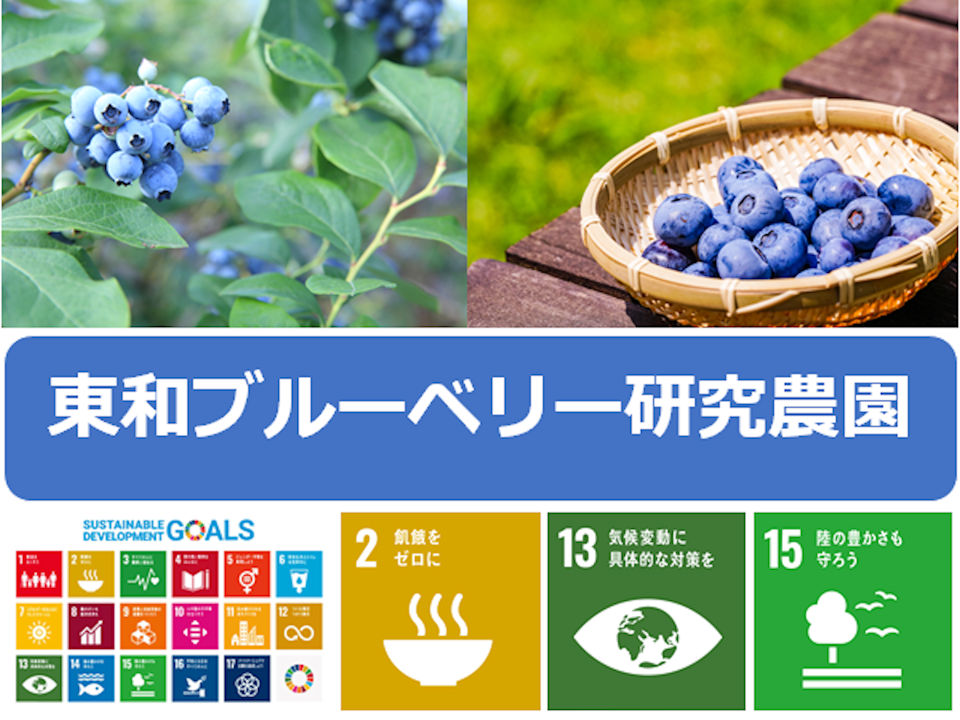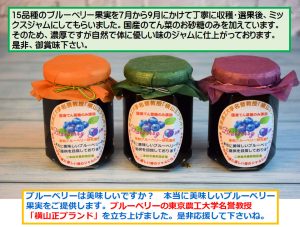Views: 268
Last updated: October 29, 2024.

After retiring from Tokyo University of Agriculture and Technology, my wife and I relocated from Fuchu City, Tokyo to Towa district, Nihonmatsu City. With the kind support of our local community, we began our blueberry farming journey in May 2020. Under the guidance of experts such as Mr. Ukawa of Ukawa Blueberry Farm in Aizu, a renowned blueberry grower in the region, Mr. Ohno of Ohno Farm, our local agricultural expert, and Professor Emeritus Ogiwara of Tokyo University of Agriculture and Technology, a leading authority on Blueberry, we have been diligently cultivating our blueberry plants.
The Field Science Center of the Faculty of Agriculture at Tokyo University of Agriculture and Technology is considered the birthplace of blueberry cultivation in Japan, where research and development of blueberry varieties suitable for the Japanese climate first began.
I remember the excitement when our blueberry bushes bloomed in May 2021. Mr. Ukawa was so encouraging and told me it was time to start harvesting. I’ll never forget that first harvest in July.
Harvesting and selling fruit was a completely new experience for me. The process of finding buyers and determining the selling price was both exciting and demanding.。
Due to the small quantity of our fruit, the nearby JA declined to handle our products. Fortunately, we were able to secure sales at JA koransho-ichi in Nihonmatsu City and the roadside station “Adachi” on National Route 4. I was filled with anxiety about whether our fruit would sell, but the news of our successful sales was truly heartwarming.
I did a blueberry planting in spring 2022, focusing on varieties known for their larger fruit.
Entering our second year of fruit sales, we began selling our products in early July 2022. We expanded our sales channels to include JA Fukushima Sakura’s farm product direct sales store “Agri-a” in Koriyama City, as well as the private farm product direct sales store “Beresh”.
While we experienced an increase in our blueberry yield in the previous year, we faced challenges with fruit drop caused by inadequate harvesting and pest damage from insects like beetles and hornets. To improve our production and reduce crop loss, we will be implementing several strategies starting in the 2023 fiscal year. These include installing beetle and hornet traps and adopting low-chemical farming methods. Furthermore, we are committed to enhancing our harvesting process to minimize fruit damage and maximize yield.
Additionally, starting in 2022, blueberries from Towa Blueberry Research Farm have been sold under the “Tadashi Yokoyama Brand,” named after a professor emeritus at Tokyo University of Agriculture and Technology.
The catchphrase is as follows.
Do you like blueberries? We offer truly delicious blueberries. We’ve launched the “Masayoshi Yokoyama Brand” of blueberries, named after a professor emeritus at Tokyo University of Agriculture and Technology. Please give us your support!

During the 2022 fiscal year, our farm engaged in both the sale of frozen fruits and the production of jam.

“While I may be biased, I’ve been overwhelmed by the positive feedback on our new blueberry jam. Customers have commented on its rich flavor and smooth texture, and I couldn’t agree more!”
We are conducting an experiment, which began in fiscal year 2023, with the aim of finding methods to accelerate the growth of blueberry cuttings.
Yokoyama, the representative of our research farm, has been conducting long-term research at the Faculty of Agriculture, Tokyo University of Agriculture and Technology on how to utilize soil microorganisms for agriculture, particularly through biofertilizers (https://bio-f.com/). Building on this research, we are now experimenting with a blueberry orchard as a model to explore the possibility of sustainable agricultural production that is friendly to the global environment, in line with the SDGs.
Blueberry roots already have mycorrhizal fungi symbiotically living with them. As a first step, we will experiment with how to utilize new beneficial microorganisms with these symbiotic microorganisms.
Fruit trees form symbiotic relationships with filamentous fungi. While arbuscular mycorrhizal fungi are commonly used in fruit tree cultivation, the nature of interactions between fruit tree roots and bacteria is less clear. To address this knowledge gap, Towa Blueberry Research Farm initiated a study in 2023 to investigate the effects of inoculating blueberry cuttings with Bacillus spp. bacteria, a microbial agent developed in-house and known for promoting root development and growth in rice and vegetables. We are particularly interested in understanding how these bacteria might enhance rooting and overall growth of blueberry cuttings, contributing to more sustainable agricultural practices.

The experiment involved two groups of cuttings: Northern Highbush and Rabbit Eye blueberries. One group was planted in a growing medium supplemented with Yume Bio, while the control group was planted in a standard growing medium without any added microbial inoculant. The treated group was placed on the left side of the experiment, and the control group was on the right.
Our year-long study revealed that the inoculation of blueberry cuttings with Yume Bio resulted in a significant enhancement of root formation.

Furthermore, we have set up a trial where mature blueberry trees in pots were treated with a top-dressing of Yume Bio (evident by the yellowish surface of the left and center pots), compared to a control group. We are continuously monitoring the growth of these plants. Preliminary observations from the 2023 treatment suggest that Yume Bio may have mitigated leaf scorch during the severe drought conditions of 2024, however, more extensive research is needed to confirm these findings.